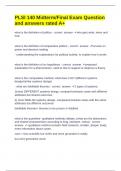Samenvatting
Summary Managing Negotiations all mandatory articles summarized
All the mandatory articles, including Hofstede's cultural dimensions, are summarized. This contains the articles used for the presentations which is also part of the exam. All the important focus points are mentioned.
[Meer zien]







